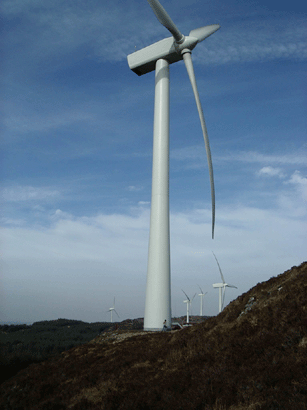| The Wind Monster. |
(1098) |
| FACTS ON WINDFARMS,WINDFARMING, WINDMILLS AND WIND ENERGY |
A personal statement from John Etherington PhD DIC BSc ARCS
Dr John Etherington was Reader in Ecology in the University of Wales until his retirement to Pembrokeshire in the early 1990s. He was educated at Imperial College in the 1950s-60s. Much of his research and teaching was in the field of environmental chemistry and physics. He first wrote, en passant, about the impact of human activity on carbon dioxide emission and "greenhouse-warming” in a book published in 1975 and re-editioned in 1982. John has published several other books, many research papers, and is a Thomas Huxley Medallist of the Royal College of Science. He was co-Editor of the international Journal of Ecology from 1988 to 1991 and for the past 15 years has edited a local history Newsletter based in the Vale of Glamorgan village of Llancarfan. |
A few facts and some primary school arithmetic tell us without a shadow of doubt that windpower is not the solution to the UK electricity problem. Nor will it have the slightest effect on climatic change.

Government windpower targets would reduce our UK total carbon dioxide emission by less than 3% which represents a global saving of less than 0.1%. This would not be instrumentally measurable, let alone influence the climate of the world!
Electricity generated from the wind is intermittent and cannot provide the legally required 24-hour supply of voltage- and frequency-stabilised supply. It has to be backed-up at all times by a running fossil fuel generating system which imposes a financial cost and also part-negates the saving of CO2 emission.
Just to replace the output of Wales' biggest power station, Aberthaw, we would need 3000 machines, 330 feet high, in the tiny 8000 square miles of our magical land.
The Intergovernmental Panel on Climatic Change has specifically warned that its hypothetical models of climatic change “are not assigned probabilities of occurrence, neither must they be interpreted as policy recommendations”. And yet, the government decided we shall have windpower. Is this not a policy decision?
Wind electricity is subsidised to more than three times the wholesale value of conventionally generated electricity but government has deviously renamed the extra cash a “premium”. The term was scandalously changed from “subsidy” to “no direct subsidies” between the consultation report and final report of WAG’s Renewable Energy document. Unfortunately on Radio Wales, Eye on Wales (1st June 03), Economic Development Minister, Andrew Davies, slipped his tongue around SUBSIDY. That’s what it is and it will land on your electricity bill.
The destruction of landscape and potentially of rural income from tourism is a horrific prospect as it is Wales' largest rural industry. We may not like the fact, but tourism has to be the future of Welsh countryside life. It earns almost £2 billion a year for Wales, contributes 7% to Welsh GDP and far outweighs agriculture, at less than 2% GDP. The electricity industry also contributes less than 2% to GDP so, even if the Government’s target of 10% of electricity from renewables (mainly wind) is achieved, the windpower industry will be worth less than 0.2% of GDP. There is accumulating proof, such as the 2002 VisitScotland attitudes-survey that tourists will avoid "turbinised" landscapes and so, for a tiny wind-electrical industry, we are to jeopardise our main rural source of income which is some 35-times larger! We should stop now.
Dr. John Etherington
Former Reader in Ecology in the University of Wales
Links:
* The Naked Truth about Windfarms, Wind Energy, and CO2 Emissions.
* Windfarms and CO2 Savings - Debunking the Global Warming scare.
* More wind turbines cause chaos
For more articles on windfarms, use the website search button, writing: "windfarms"
ESPAÑOL: ir a www.google.com pinchar "herramientas del idioma" y seguir las instrucciones.
También pruebe con el buscador de iberica 2000, escribiendo: "eolica"
| Insertado
por: Mark Duchamp (22/10/2003) |
| Fuente/Autor:
Dr. John Etherington
Former Reader in Ecology in the University of Wales. |
Valoración
Comentarios
|
